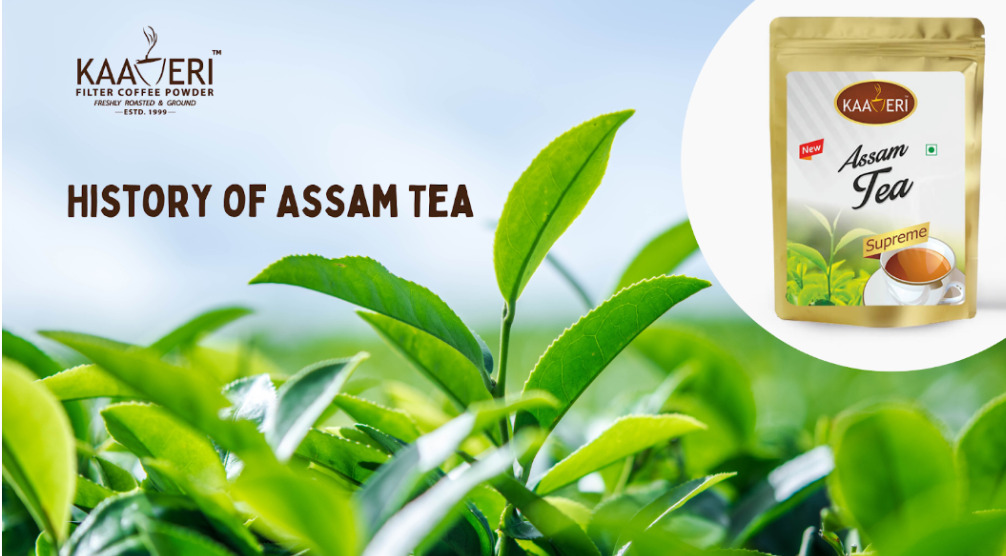
From Singpho Secrets to Global Brew: Unravelling the Unknown History of Assam Tea
History of Assam Tea
Assam tea, known for its rich and robust flavour, has a fascinating history that dates back centuries. The story begins with theindigenous Singpho tribe, who were the first to cultivate and prepare tea as an herbal beverage long before the British discovery. The Singpho tribe in Assam used wild tea leaves and traditional methods to prepare a brew that they believed had medicinal properties.

Why is Assam Tea Famous?
Assam tea gained fame when the British East India Company’s representatives, Robert Bruce and his brother Charles Alexander Bruce, stumbled upon wild tea plants in the region during their exploration in the early 19th century. Recognizing the potential of Assam’s tea leaves, they initiated tea cultivation in the area. The tropical climate and fertile soil of Assam proved to be ideal for growing tea, leading to the establishment of tea plantations that would later become renowned for producing high-quality teas.

Tea Industry in Assam
The introduction of commercial tea plantations had a significant economic and social impact on the local communities and tribes of Assam. The tea industry rapidly expanded, attracting migrant labour from various parts of India. This influx of workers resulted in the establishment of several tea estates and transformed the landscape of Assam.

Manufacturing Process of Tea
The process of producing Assam tea involves plucking the tender tea leaves and buds from the Camellia sinensis plant. The leaves then undergo a meticulous process of withering, rolling, fermentation, and finally, drying. This process ensures the development of Assam tea’s distinct malty and full-bodied flavour.

Assam Tea vs. Darjeeling Tea
Assam tea and Darjeeling tea are two of India’s most famous tea varieties, each with its unique characteristics. While both teas come from the same Camellia sinensis plant, the differences lie in their growing regions, altitudes, and manufacturing processes. Assam tea is grown in the lowlands of Assam, known for its bold and robust flavour, while Darjeeling tea is cultivated at higher altitudes, resulting in a lighter and more delicate flavour profile.

Challenges in the Assam Tea Industry
Over the years, the Assam tea industry has faced several challenges. One significant issue has been labour conditions. Despite efforts to improve working conditions, some tea estates have faced criticism for substandard labour practices and low wages. Additionally, environmental concerns, such as deforestation and excessive use of pesticides, have raised alarms about sustainability.

Market Fluctuations and Global Demand
The Assam tea industry has experienced fluctuations in demand and prices due to factors like weather conditions, global market trends, and changing consumer preferences. However, despite these challenges, Assam tea continues to hold a significant position in the international tea market, primarily due to its strong flavour and versatility in blending with other teas.

Technological Advancements in Tea Production
To overcome challenges and increase efficiency, the Assam tea industry has embraced technological advancements in tea processing and production. Innovations such as mechanised plucking, efficient irrigation systems, and modern machinery have helped boost productivity and ensure the quality of tea leaves.

Historical and Cultural Significance of Tea in Assam
Tea has become an integral part of Assam’s local traditions and customs. Tea gardens have not only contributed to the state’s economy but have also become important cultural hubs. Tea ceremonies and festivals celebrate the tea culture, highlighting its significance in the lives of the people of Assam.

Timeline of Major Events in the Evolution of Assam Tea Industry
– Early centuries: Singpho tribe prepares tea as herbal beverage
– Early 19th century: Bruce brothers discover wild tea plants in Assam
– Mid-19th century: Commercial tea plantations established
– 1860s: Maniram Dewan plays a key role in promoting Assam tea
– 20th century: Assam becomes a major tea-producing region
– 21st century: Technological advancements in tea production
– Present: Assam tea continues to be a global favourite

Modern-Day Challenges and Opportunities
In the modern era, the Assam tea industry faces new challenges arising from changing consumer preferences and increasing sustainability concerns. Consumers are now seeking organic and ethically sourced teas, prompting the industry to adapt its practices. Embracing sustainable methods and engaging in eco-friendly initiatives present opportunities for the industry to appeal to conscious consumers and ensure a thriving future.

In conclusion, the history of Assam tea is deeply rooted in its indigenous tribes and their traditional preparation of tea as an herbal beverage. The commercialization of tea by the British and subsequent innovations have shaped the tea industry in Assam. Today, Assam tea remains an internationally renowned product, but the industry must navigate challenges and embrace sustainability to secure its position in the ever-evolving global market.
Buy Assam Tea from Kaaveri Coffee!
Shop now the rich and authentic flavours of Assam tea powder sourced directly from the lush tea gardens of Assam by Kaaveri Coffee. Our premium Assam tea offers a bold and satisfying brew that will elevate your tea-drinking experience. Visit our website now and savour the essence of Assam in every sip!



No Comments